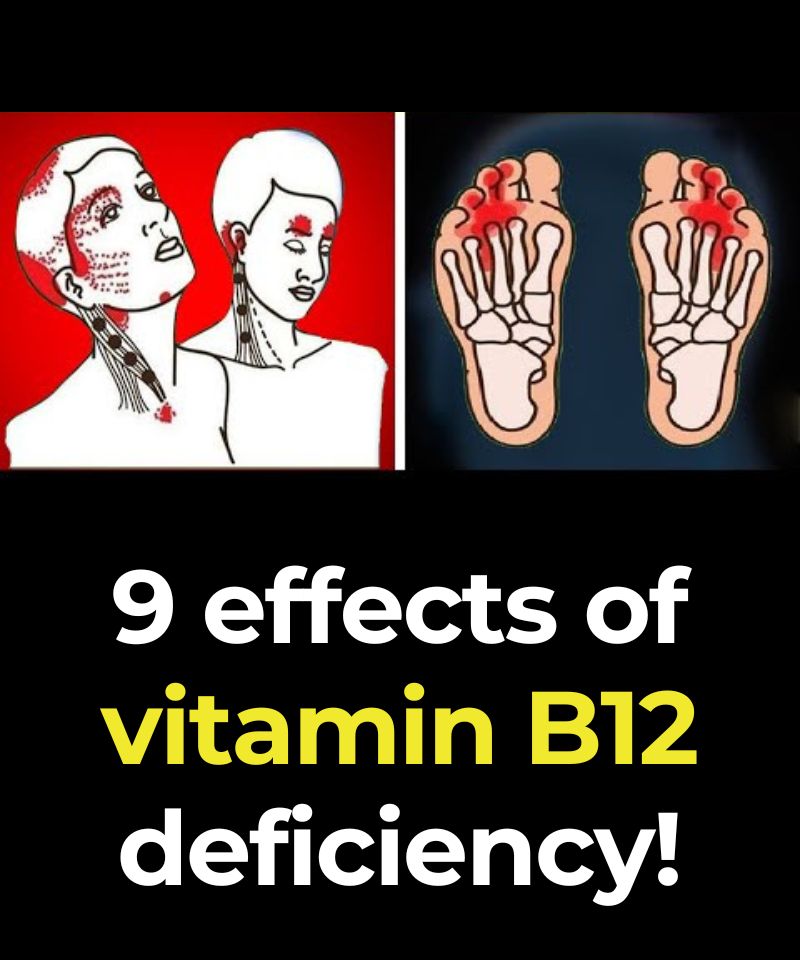
Vitamin B12, also called cobalamin, is an essential nutrient that supports many critical functions in the body—including red blood cell formation, nerve health, and DNA production.
A deficiency in B12 can lead to a variety of symptoms, some of which may appear gradually and be easy to overlook. However, if untreated, the consequences can become severe. Below are nine common signs of a vitamin B12 deficiency and why it’s important to recognize them early.
Ongoing Fatigue and Weakness
Feeling constantly tired or lacking strength is one of the first signs of low B12. This happens because your body isn’t producing enough healthy red blood cells, which are needed to carry oxygen throughout the body.
Pale or Yellow-Tinted Skin
Notice your skin looking pale or slightly yellow? This could be a result of B12 deficiency. When red blood cells break down more rapidly than normal, they release bilirubin—a substance that gives the skin a yellowish tone.
Shortness of Breath and Lightheadedness
With fewer red blood cells transporting oxygen, your body may struggle to function during physical activity. This can cause difficulty breathing, particularly when exerting yourself, as well as spells of dizziness or feeling faint.
Tingling or Numb Sensations in Extremities
Vitamin B12 is essential for maintaining healthy nerve function. A lack of it can damage the protective myelin sheath around nerves, leading to a tingling or numb feeling—often described as “pins and needles”—typically in the hands and feet.
Problems With Balance and Coordination
As nerve damage progresses, it can affect your ability to walk steadily or maintain balance. This symptom is especially risky for older adults, increasing the chance of falls and injuries.
Memory Issues and Cognitive Decline
Deficiency in B12 may also affect brain health, contributing to memory lapses, confusion, or trouble concentrating. In severe cases, it can resemble dementia and significantly impair mental clarity and focus.
Mood Disorders: Depression and Anxiety
B12 plays a key role in producing neurotransmitters like serotonin and dopamine. Without enough of it, your mood may shift—resulting in increased depression, irritability, or anxiety. Some studies suggest that B12 supplementation can improve mood in people with low levels.
Mouth Sores and Inflamed Tongue
A swollen, red tongue (known as glossitis) and painful mouth ulcers can also signal a B12 deficiency. These issues can cause discomfort while eating, speaking, or swallowing, and may be confused with other conditions at first.
Vision Problems
Though rare, B12 deficiency can affect the optic nerve, resulting in blurred vision, double vision, or light sensitivity. If this occurs, it typically indicates a more advanced stage of deficiency and requires urgent medical attention.
Who’s More Likely to Be Deficient in B12?
Certain individuals face a higher risk, including:
- Adults over 60 (due to lower stomach acid levels)
- Vegans and vegetarians (as B12 is mostly found in animal products)
- People with digestive conditions like Crohn’s or celiac disease
- Those taking medications like metformin or acid reducers
What You Can Do
If you’re noticing any of these symptoms—especially if you belong to a higher-risk group—talk to your doctor. A simple blood test can reveal your B12 levels, and supplementation is often easy and effective.
Final Thoughts
Vitamin B12 may not always be in the spotlight, but its role in keeping your body and brain functioning properly is vital. Recognizing the early signs of deficiency can help you take proactive steps toward better health.

















